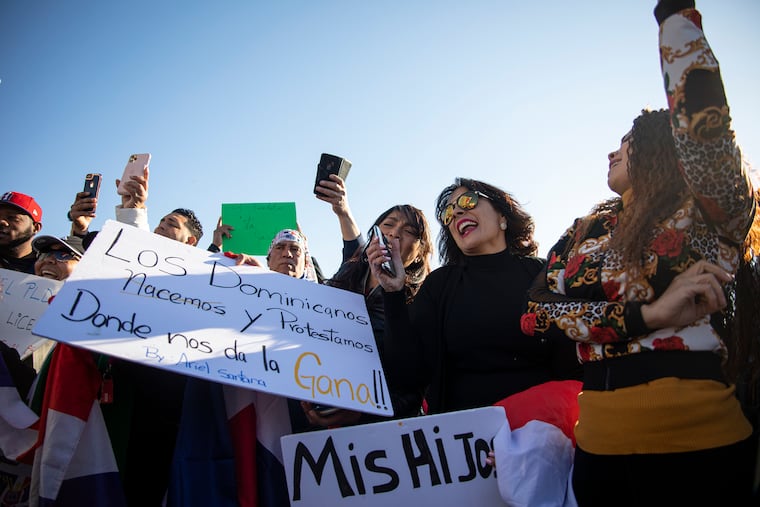‘Viva la democracia!’: Philly Dominicans rally for voting rights after municipal elections suspended in the Caribbean nation
Voting irregularities in last weekend’s municipal elections have sparked concerns here that they could be repeated in the country’s presidential election in May, when Philly Dominicans would be able to cast their votes.

It started around 3 p.m. with a couple dozen people huddled near the corner of American and Somerset in the city’s Fairhill section.
An hour later, a couple hundred had descended on the scene, waving and wearing Dominican Republic flags, chanting pro-democracy and anti-corruption slogans and shutting down all southbound traffic in a rowdy show of support for free elections in the Caribbean nation that has been roiled by botched municipal elections.
“I always vote. That’s why I’m here," said Paola Castillo, who has been living in the United States for 12 years and traveled from Reading to join Saturday’s protest. “It’s not about the government or the opposition. It’s about the people. It’s our democracy. That’s what we care about.”
It was the sixth consecutive day that Dominicans and Dominican Americans protested in streets and parks there, in the U.S., and elsewhere. The international outcry was sparked by suspended municipal elections last Sunday due to what authorities said was a software glitch with the electronic voting system. Many voters, however, suspect that the election was halted to benefit the governing Dominican Liberation Party (PLD, in Spanish).
Since 2004, Dominicans living abroad have been eligible to vote if they register with the local Central Election Board.
Last Sunday, the election board (JCE, for its acronym in Spanish) suspended voting four hours after it began, after reports that opposition-party candidates were not appearing on the electronic ballots.
Standing on a concrete barricade Saturday afternoon, Juan Cruz of South Philly was shooting video of the protest with his phone and watching earlier, larger events in Barcelona, Spain, and in Santo Domingo, the capital of the Dominican Republic.
“It’s everywhere,” he said.
Cruz said he’s concerned that the voting irregularities in last weekend’s municipal elections could be repeated in the country’s presidential election in May, when Philly Dominicans would be able to cast their votes.
“We are trying to do this to prevent that from happening,” said Cruz, who has been living in the United States for 10 years. “We need someone we can trust.”
The electronic system was used in 18 cities and regions with high population density, accounting for 62.4% of the electorate. Paper ballots were to be used elsewhere. More than 7.4 million voters were due to vote to elect 3,849 positions in 158 municipalities across the Dominican Republic.
Julio César Castaños Guzmán, president of the JCE, addressed the issue at a news conference the day of the election and admitted that nearly half of the electronic ballot machines were not working correctly.
A leaked video from the moment when the board members discussed the issue suggested that the JCE never ran tests of the electronic ballot machines — although the JCE had informed the public that the test runs of the automatic voting system were “successful” in July, August, and September 2019, and January of this year. The new voting system cost $19 million.
It was the first time in Dominican history that an election has been suspended.
Despite the announcement Friday that the Organization of American States (OAS) would investigate the circumstances of the suspended election, the ordeal has led to outrage among Dominican populations, especially youth on the island and abroad.
“I’m here representing my family. We want fairness,” said Henry Peralta, a first-generation Dominican from South Jersey. “They were only showing the party in power. We want answers. There are a bunch of things going on that are completely illegal and we have to let people know."
At Saturday’s rally, the crowd railed against corruption in the Dominican Republic, chanting, “No pica pollo,” a reference to the ruling party’s practice of buying fried chicken for the poor in exchange for their vote. They also chanted “Lo votamos, lo sacamos” — they voted them in and they can vote them out.
According to JCE’s last report on Dominicans voting abroad, there are 589,497 registered to vote in 58 countries around the world, up by 6.5% from the last presidential election registration process in 2016. The largest percentage of voters is in the United States with 369,922 voters registered (73.85%), including more than 31,000 in Puerto Rico, followed by Spain with 73,660 (14.71%).
Dominicans locally and around the United States are requesting a thorough and transparent investigation into the cause for suspending the municipal elections on Sunday, and demand that all of JCE’s board members step down for negligence and corruption.
Massachusetts demonstrations — in Lawrence and Boston — took place Friday. On Saturday, demonstrations occurred simultaneously in New York City and Philadelphia in the U.S., in Barcelona and in London. Protests in Providence, R.I., and San Francisco are planned for Sunday, along with one in Toronto. Others have already taken place in Italy and Switzerland.
The JCE has called for new municipal elections March 15 with paper ballots. Several opposition leaders objected to the use of electronic voting due to fears software could be manipulated.
Luis De La Cruz of North Philadelphia said his native country needs to fix its election process in time for the May presidential election.
“We don’t live there, but we’re still Dominican. We care about what happens there,” De La Cruz said. “I don’t care about what party you belong to. We just want democracy.”